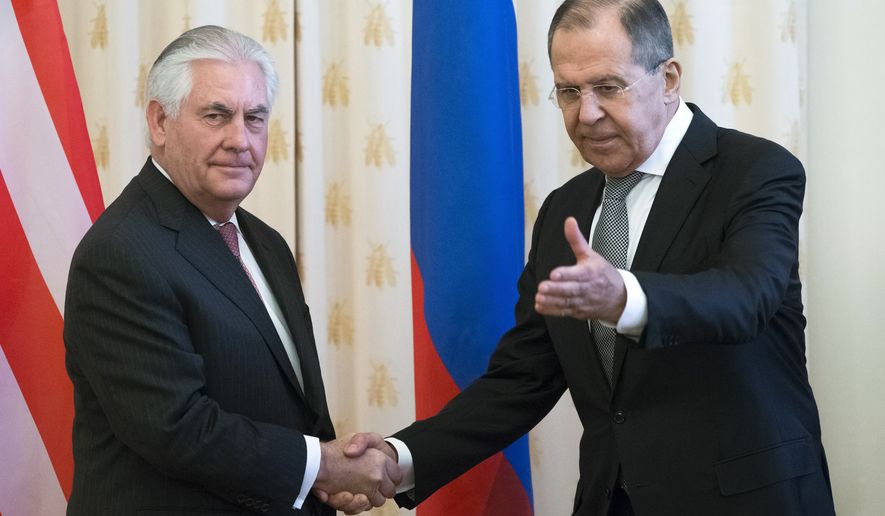Russian President Vladimir Putin is considering reopening a vital battlefield communications node between his forces and U.S. troops in Syria, which had been shuttered since Washington’s strike on Syrian forces last week.
Russian Foreign Minister Sergey Lavrov told reporters Wednesday that Mr. Putin was willing to re-establish the U.S.-Russia deconfliction line.
“We are willing to put it back into force,” but required that Washington reaffirm that its Syria strategy is focused on defeating the Islamic State, or ISIS or ISIL, and not toward destabilizing the regime of President Bashar Assad, Mr. Lavrov said during a joint press conference with Secretary of State Rex Tillerson.
The announcement came after a two-hour meeting between Mr. Tillerson, Mr. Lavrov and Mr. Putin, as part of a bilateral security summit in Moscow.
The Russian president had refused a meeting with the top U.S. diplomat after U.S. warships attacked the al Shayrat airbase in western Syria Friday. The strike was in retaliation for a Syrian chemical attack against anti-government fighters in Idlib province.
Defense Secretary James Mattis told reporters Tuesday at the Pentagon that the decision to strike the al Shayrat airbase in western Syria “was in no way a harbinger of a change in our campaign” against Islamic State in the country.
Russian Ministry of Defense suspended communications with U.S. counterparts in Syria, including the deconfliction line designed to ensure American and Russian air assets do not interfere with each other’s operations in Syria, in the immediate aftermath of the American naval strike.
But once the line is reconnected, the communications between Russian and U.S. officials will remain private, Col. John Dorrian, the top U.S. spokesman in Iraq, said Wednesday.
“We can’t get into the business of discussing the day-to-day operations with regard to … the deconfliction line,” Col. Dorrian said during a teleconference from Baghdad.
“From my conversations with the people that are directly involved … is that that was not a productive thing to do. And that’s the reason that we are no longer doing readouts of what those discussions are, and we will not get back into that business,” he said.
American and Russian forces had worked around the deconfliction line’s cancellation, to ensure safety in the skies above Syria, U.S. Central Command spokesman Col. John Thomas said Friday.
“We have continued to deconflict as necessary with the Russians,” as U.S. air operations continue, but declined to comment how those talks were being handled, Col. Thomas told reporters at the Pentagon.
“There are other ways to deconflict, and we are going to use all of those means, no matter what the situation is with that particular [deconfliction] line,” Col. Thomas said during a teleconference from command headquarters in Tampa, Florida. “It is not the only means available, but it has been a helpful means in the past,” he added.
• Carlo Muñoz can be reached at cmunoz@washingtontimes.com.




Please read our comment policy before commenting.